The Four Characteristics Of Data-Driven Marketers
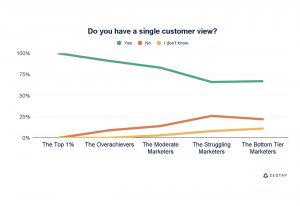
But while the top 1% marketers are ahead of the pack for now, others are rapidly closing the gap: of those marketers who’ve yet to achieve a single customer view, 99% of them reported that they plan to achieve it by the end of 2022:
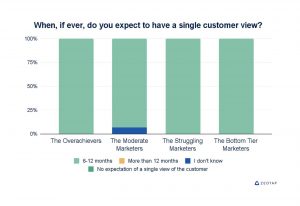
Two: The top marketers lean on CDPs for data collection and management:
When it comes to finding the right stack to leverage data, marketers have complex hurdles to jump – from legacy tools often held in different teams to lengthy integration processes.
When we look at how the top 1% of marketers manage their data, Customer Data Platforms (CDPs) take centre stage, and it’s with good reason: in 2021 alone, the CDP industry reached an estimated $1.6 billion in revenue.
In fact, CDPs are particularly popular amongst the more successful marketers in general; research showed a 39% percentage point increase in CDP adoption from the least to most successful marketers.
One detail to note: while the most successful marketers transition to CDPs, the less successful marketers continue to cling to platforms like DMPs.
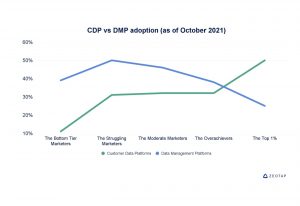 When comparing a CDP vs a DMP, the latter primarily falls short as it relies on third-party data, retains data for shorter periods of time, and is unable to identify users to create the most accurate audiences possible the way a CDP can.
When comparing a CDP vs a DMP, the latter primarily falls short as it relies on third-party data, retains data for shorter periods of time, and is unable to identify users to create the most accurate audiences possible the way a CDP can.
Three: The top marketers have comprehensive data privacy compliance practices in place:
Every marketer wants more customer data – but ever since the introduction of new data privacy and security regulations like GDPR and CCPA, marketers have faced a huge challenge in how to capture, store and use customer data in a way that doesn’t fall foul of the law.
The good news is that nearly 100% of the top 1% of marketers feel highly confident about their data privacy practices:
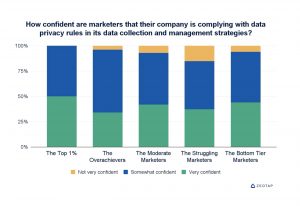
Meanwhile, their less successful counterparts also remain highly confident, but still lack the practices that ensure complete compliance, such as a single customer view.
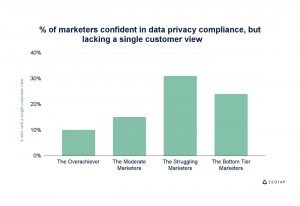
The issue behind this misplaced confidence goes back to the challenge of capturing user consent in today’s multi-touch, multi-channel journeys.
It’s highly likely that consent is captured across multiple tools (for example a consent management platform, a loyalty programme and email marketing), which means an individual can express (and withdraw) consent in many different places. Unless those choices are resolved, it’s likely that activating that data can fall foul of regulations.
This is what makes a single customer view a necessity for marketers – it’s not just about prioritising the customer journey, but the consent journey as well. Marketers need a comprehensive view of a customer’s consent preferences across those multiple touch-points and channels. Without a ‘golden record’, compliance isn’t completely ensured.
Four: The top marketers turn raw data into actionable insights:
Marketers might have the largest, cleanest, most compliant data set possible – but it won’t help them unless they have a way of transforming that mass of information into insights they can use. This is what enables organisations to be truly data-driven.
One way that the top 1% marketers are able to fully leverage their data is by using machine learning. Similar to the correlation between successful marketers and achieving a single customer view, machine learning adoption correlates strongly with success.
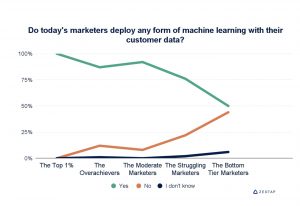
Unlock more data-driven marketing secrets.
All in all, the marketers who’ve continued to pursue data-driven practices despite the many twists and turns of the last year are now better equipped to face (and overcome) the marketing challenges of tomorrow.
In the meantime, other marketers are in the starting phase of creating the usable dataset—the proverbial ‘golden record’ of a single customer view—but this is simply the beginning of being a truly data-driven function.
Want to unlock more trends adopted by today’s top 1% marketers? Download The Data Secrets of Successful Marketers for a comprehensive analysis of this year’s top marketing performers – and what less successful marketers need to do in the next year to catch up.
About Zeotap
Zeotap is the next-generation Customer Data Platform. It empowers brands to unify, enhance and activate customer data in a cookieless future, all while putting consumer privacy and compliance front-and-centre. Recognized by Gartner as a “Cool Vendor”, Zeotap works with over 80 of the world’s top 100 brands, including P&G, Nestlé and Virgin Media. It is also the founding member of ID+, a universal marketing ID initiative. For more information visit www.zeotap.com.